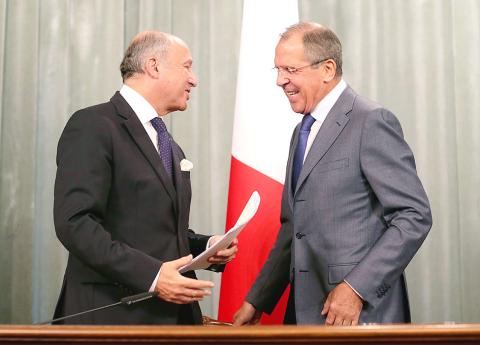Russia and France admitted yesterday they still had differences over how to solve the Syrian conflict ahead of a debate in the UN Security Council over stripping the country of its chemical arsenal.
After meeting in Moscow, Russian Foreign Minister Sergei Lavrov and French Minister of Foreign and European Affairs Laurent Fabius said they had differing visions of how to proceed toward the common goal of a peaceful and chemical weapons-free Syria.
Russia also strongly rejected claims by both France and the US that a UN report released on a sarin attack outside Damascus on Aug. 21 placed the blame with the Syrian government.

Photo: EPA
Despite sharing the same goal of destroying Syria’s weapons and holding an eventual peace conference, “we have differences over how to achieve it,” Lavrov said.
He added that the UN report “proves that chemical weapons were used,” but does not prove that the regime of Syrian President Bashar al-Assad was behind it.
“There is still no answer to the question of where the missile [used in the August 21 attack] was produced,” he said.
There is still a “most serious basis to believe that this was a provocation,” Lavrov said of the attack, calling on world powers not to “play up emotions” when making decisions, but rather “rely on professionals.”
However, Fabius said that the UN report left “no doubt that the Damascus regime was responsible” for the chemical attack.
He said there was a “difference in approach” between France and Russia on the methods required to reach peace, but the two sides were “perfectly agreed” on the need for a political solution.
Lavrov and Fabius met in Moscow a day after France, the US and the UK said they will push for a strong resolution.
Diplomats said France and the UK are preparing a draft that will demand a threat of sanctions if al-Assad does not comply with the chemical disarmament plan.
Lavrov stressed that the agreement he reached with US Secretary of State John Kerry on Saturday meant that the opposition will also be responsible for compliance and that the resolution will not be under the chapter of the UN charter that allows the use of force.
The report by UN experts released on Monday said the attack used sarin gas delivered by surface-to-surface rockets, but did not assign blame to either side.
China, which has voted together with Russia in the past against UN Security Council resolutions spelling out intervention or sanctions in Syria, said yesterday it would be taking a “serious look” at the UN report.

AGING: As of last month, people aged 65 or older accounted for 20.06 percent of the total population and the number of couples who got married fell by 18,685 from 2024 Taiwan has surpassed South Korea as the country least willing to have children, with an annual crude birthrate of 4.62 per 1,000 people, Ministry of the Interior data showed yesterday. The nation was previously ranked the second-lowest country in terms of total fertility rate, or the average number of children a woman has in her lifetime. However, South Korea’s fertility rate began to recover from 2023, with total fertility rate rising from 0.72 and estimated to reach 0.82 to 0.85 by last year, and the crude birthrate projected at 6.7 per 1,000 people. Japan’s crude birthrate was projected to fall below six,

US President Donald Trump in an interview with the New York Times published on Thursday said that “it’s up to” Chinese President Xi Jinping (習近平) what China does on Taiwan, but that he would be “very unhappy” with a change in the “status quo.” “He [Xi] considers it to be a part of China, and that’s up to him what he’s going to be doing, but I’ve expressed to him that I would be very unhappy if he did that, and I don’t think he’ll do that. I hope he doesn’t do that,” Trump said. Trump made the comments in the context

SELF-DEFENSE: Tokyo has accelerated its spending goal and its defense minister said the nation needs to discuss whether it should develop nuclear-powered submarines China is ramping up objections to what it sees as Japan’s desire to acquire nuclear weapons, despite Tokyo’s longstanding renunciation of such arms, deepening another fissure in the two neighbors’ increasingly tense ties. In what appears to be a concerted effort, China’s foreign and defense ministries issued statements on Thursday condemning alleged remilitarism efforts by Tokyo. The remarks came as two of the country’s top think tanks jointly issued a 29-page report framing actions by “right-wing forces” in Japan as posing a “serious threat” to world peace. While that report did not define “right-wing forces,” the Chinese Ministry of Foreign Affairs was

PREPAREDNESS: Given the difficulty of importing ammunition during wartime, the Ministry of National Defense said it would prioritize ‘coproduction’ partnerships A newly formed unit of the Marine Corps tasked with land-based security operations has recently replaced its aging, domestically produced rifles with more advanced, US-made M4A1 rifles, a source said yesterday. The unnamed source familiar with the matter said the First Security Battalion of the Marine Corps’ Air Defense and Base Guard Group has replaced its older T65K2 rifles, which have been in service since the late 1980s, with the newly received M4A1s. The source did not say exactly when the upgrade took place or how many M4A1s were issued to the battalion. The confirmation came after Chinese-language media reported